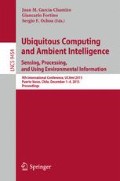Abstract
This article introduces a software environment called RBox, built to experiment with recommender systems (RS), regardless of the application domain. In spite of the ubiquity of RS on the Web 2.0 this research field still lacks a unique way of representing collective intelligence. To solve this problem, this article adopts a generic event-driven approach providing a unique RBox data schema. Thus, it is possible to achieve the abstraction of collaborative events that occur on Web 2.0 such as ranking, tagging and voting. A comparison with other tools illustrates the contribution of RBox to the RS field. For instance, this tool enables reusing algorithms and executing experiments that were originally intended for a specific application domain, for other ones. Finally, considering RS tools’ limitations, the next versions of RBox will integrate ubiquitous computing and context-aware recommender systems.
Access this chapter
Tax calculation will be finalised at checkout
Purchases are for personal use only
References
Adomavicius, G., Tuzhilin, A.: Toward the next generation of recommender systems: a survey of the state-of-the-art and possible extensions. IEEE Trans. Knowl. Data Eng. 17, 734–749 (2005)
Adomavicius, G., Tuzhilin, A.: Context-aware recommender systems. In: Ricci, F., Rokach, L., Shapira, B., Kantor, P.B. (eds.) Recommender Systems Handbook, pp. 217–253. Springer, New York (2011)
Alag, S.: Collective Intelligence in Action. Manning Publications Co., Greenwich (2008)
Candillier, L., Jack, K., Fessant, F., Meyer, F.: State-of-the-art recommender systems. In: Collaborative and Social Information Retrieval and Access: Techniques for Improved User Modeling, pp. 1–23. IGI Global (2009)
Ekstrand, M.D., Ludwig, M., Konstan, J.A., Riedl, J.T.: Rethinking the recommender research ecosystem: reproducibility, openness, and LensKit. In: Proceedings of the Fifth ACM Conference on Recommender Systems, pp. 133–140. ACM, Chicago (2011)
Gantner, Z., Rendle, S., Freudenthaler, C., Schmidt-Thieme, L.: MyMediaLite: a free recommender system library. In: Proceedings of the Fifth ACM Conference on Recommender Systems, pp. 305–308. ACM, Chicago (2011)
Glez-Peña, D., Reboiro-Jato, M., Maia, P., Rocha, M., Díaz, F., Fdez-Riverola, F.: AIBench: a rapid application development framework for translational research in biomedicine. Comput. Methods Prog. Biomed. 98, 191–203 (2010)
Hahsler, M.: Recommenderlab: A Framework for Developing and Testing Recommendation Algorithms (2011)
Lebanon, G.: C/Matlab Toolkit for Collaborative Filtering. http://www.cs.cmu.edu/~lebanon/IR-lab.htm
Marcel, M.A., Ball, M., Boley, H., Greene, S., Howse, N., Lemire, D., McGrath, S.: RACOFI: A Rule-Applying Collaborative Filtering System (2003)
Mettouris, C., Papadopoulos, G.: Ubiquitous recommender systems. Computing 96, 223–257 (2014)
O’Conner, J.: Creating Extensible Applications With the Java Platform. http://www.oracle.com/technetwork/articles/javase/index-140417.html
Ricci, F., Rokach, L., Shapira, B.: Introduction to recommender systems handbook. In: Ricci, F., Rokach, L., Shapira, B., Kantor, P.B. (eds.) Recommender Systems Handbook, pp. 1–35. Springer, New York (2011)
Tareen, B., Lee, J., Lee, S.: Synergy: a workbench for collaborative filtering algorithms on user interaction data. In: International Workshop on User Data Interoperability in the Social Web (2010)
Acknowledgements
This work was supported by the National Science and Technology Commission of Chile FONDEF project called “Observatorios Escalables de la Web en Tiempo Real” [D09I1185], between 2011–2013.
Author information
Authors and Affiliations
Corresponding authors
Editor information
Editors and Affiliations
Rights and permissions
Copyright information
© 2015 Springer International Publishing Switzerland
About this paper
Cite this paper
Leiva-Lobos, E.P., Palomino, M. (2015). RBox: An Experimentation Tool for Creating Event-Driven Recommender Algorithms for Web 2.0. In: García-Chamizo, J., Fortino, G., Ochoa, S. (eds) Ubiquitous Computing and Ambient Intelligence. Sensing, Processing, and Using Environmental Information. UCAmI 2015. Lecture Notes in Computer Science(), vol 9454. Springer, Cham. https://doi.org/10.1007/978-3-319-26401-1_12
Download citation
DOI: https://doi.org/10.1007/978-3-319-26401-1_12
Published:
Publisher Name: Springer, Cham
Print ISBN: 978-3-319-26400-4
Online ISBN: 978-3-319-26401-1
eBook Packages: Computer ScienceComputer Science (R0)

